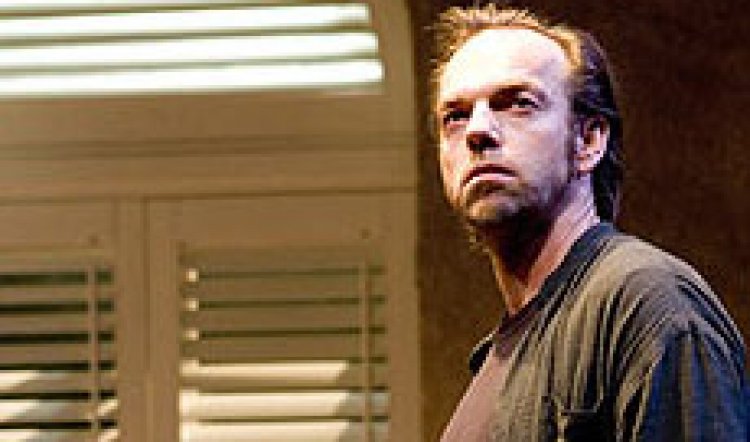
Riflemind
Riflemind, Wharf 1, Sydney Theatre Company, October 10-December 8; ww.sydneytheatre.com
Andrew Upton isn't the first writer to be morbidly fascinated by the world of rock'n'roll. It's both the most repellent and the most attractive milieu to come out of 20th century western culture. I say this with the confidence of a former rock chick who is lucky to have escaped with grey cells and septum relatively intact.
So what is it about rock gods, aside from sex, drugs and the music? It's a question that was being asked by some bemused members of the audience on the way out of the theatre and it's reminiscent of Louis Armstrong's answer to the question, what is jazz? He said: If you have to ask, you'll never know. Much the same can be said of those who don't "get" rock.
Why are rockers the most enduringly desirable products of the culture? Well if the wicked pleasures of the sex, the drugs and the music (ah, the music!) aren't sufficient explanation then you're probably an Iranian mullah and there's no point going into a debate about decadence and demons. Otherwise, Upton's new play offers a few hints.
Upton has plunged deep into the dark side of rock with Riflemind - the name of a once-mighty band - in a story reminiscent of the trajectory and personal relationships of 80s-90s US country-rockers Uncle Tupelo. (Except that trio split up before middle age and creative drought mired them in nostalgia and too much recrimination.) It's a potentially rich vein to mine because most movies, musicals and plays on the topic tend to focus on the bubblegum side of rock - Bye Bye Birdie or the spoof Meet The Rutles, School of Rock - and, to avoid disenfranchising the lucrative kiddie market, eschew the disreputable aspects. (Rock Follies, Foxes, Stardust, The Rose and on stage in David Hare's Teeth 'n' Smiles which, incidentally, featured a seminal rock chick performance from Helen Mirren in its original production.) But rock was never meant to be nice, which is where Riflemind comes in.
The members of the band are LA-domiciled drummer Moon (yes, really) played with plaintive sincerity by Steve Rodgers, bass player Phil (cool, shades-wearing Marton Csokas) and the band's leader, guitar hero and songwriter John (Hugo Weaving). Moon's parlous finances are the real impetus behind the attempt to re-form, revisit the old songs and set up a high-grossing tour. The play opens as he and Phil, Phil's chick Cindy (Susie Porter) and the band's randy barrow-boy manager Sam (Jeremy Sims) arrive by helicopter at John's secluded English country estate. As a precaution - John has indicated he never wants to play again - they have brought with them new generation ace axeman Lee, (Ewen Leslie).
It's a move fraught with danger because John, as written, is a volatile cocktail of Brian Wilson at his most reclusive, Phil Spector at his most paranoid and John Lennon at his nastiest. It is little wonder that all his confederates treat him like an unexploded bomb. Nevertheless, John seems untroubled by the appearance of the potential usurper and chooses other targets instead, in particular, Sims' chirpy chappy Sam. Sam effects not to notice the roiling agro and routine humiliation John dishes out to him, however, and provides some welcome light relief in a performance that dips its lid to Adam Faith's Budgie and Stardust characters.
John is a curiously unlikely character, despite Weaving's sustained performance of smouldering menace. John is one dimensional and charmless in the extreme; nothing is offered to suggest why he is the creative genius or why he so effortlessly attracts and keeps his acolytes. Instead, he glowers, glowers some more; is boring, is more boring and eventually goes back to glowering again. The only time he shows even a glimmer of humanity is in his relationship with his equally unlikely, strangely suburban wife Lynn (Susan Prior). They are an improbable couple but eventually it becomes apparent that her daggy white anorak and determinedly sensible demeanour conceal a secret as dark as any the band could ever concoct.
It must be said, though, that Lynn's credibility as a character is a product of Prior's performance rather than in the role as written. Prior is magnificent and memorable in Riflemind. She is one of those rare chameleon actresses who go way beyond the normal complement of three emotions and is dazzling, even in this starry company. By way of contrast, Susie Porter shines, briefly, in her one decent scene - with Sims - but otherwise suffers the fate of the real life rock babe: she sits around waiting and smoking being ignored, pawed or bored.
[page]Reality is a real problem with Riflemind. The first half is interminably realistic as the characters gather and obliquely introduce themselves to us. They then fail to communicate, argue or relate for some considerable time. Upton has a finely tuned ear for the fragmentary, desultory, meandering ways of real life "conversation", particularly as attempted by those suffering a combination of arrested development, substance abuse and excess alcohol (i.e. rock stars), but unfortunately it doesn't make for drama or interest on stage. The achingly drawn out preliminaries could have been cut to 10 or 15 minutes and a plot or story sought to carry the psychology, nihilistic relationships and other baggage.

None of this is helped by a set design (Richard Roberts) that emphasizes the unforgiving shape of Wharf 1's stage. John and Lynn's allegedly fabulous living room-kitchen area is Ikea white and stainless steel (okay, maybe they don't know any better, but John gives every indication of knowing only too well) and constructed in such a way as to restrict the actors to a downstage corner of sofa and floor cushion. Thing is, these people may be bombed out rock'n'rollers but it's hard to believe this is their environment. That's the problem with realism: get it right, or else. A better solution would surely have been abstraction or a stylized set.
Costume designer Tess Schofield is not similarly troubled in outfitting the group: these are people (Lynn being the exception) whose idea of style is stuck in the aspic of a distant decade. Equally successful are sound (Max Lyandvert) and lighting (Damien Cooper); both have taken the abstract sketch approach and it works.
Within the restrictions already mentioned director Philip Seymour-Hoffman seems to have induced best possible performances from his cast and keeps the pace up and in forward momentum despite the dead weight of the black hole which is the character of John. Inevitably this brings the focus back to the play itself.
Andrew Upton is an intelligent, witty and ambitious writer whose CV to date is brief if well regarded in some quarters. In normal circumstances such a writer would - if lucky - continue to develop under expert and firm supervision, preferably away from the spotlight of a capital city main stage; and others - critics, actors, directors, producers - would not be too nervous of answering honestly the question implied by a writer offering a play for public production: "What do you think?"
These are not normal times or circumstances, however. As you probably know, Upton is about to succeed to the most powerful job in Australian theatre: artistic directorship of the Sydney Theatre Company. He takes on this role in partnership with his wife who, this week, has demonstrated through the dazzling Armani connection that she is the most powerful woman in Australian theatre. None of this means the Blanchett-Uptons are not decent, well-liked, talented people who - we all hope - will do a great job for theatre in Sydney.
What is in serious doubt, however, is the kinds of answers they will get to the aforementioned question: "What do you think?" Would anyone put a dollar on the likelihood of a straight answer? A mix of fear, self interest and sycophancy is already swirling around the pair and this could have particularly damaging implications for the playwright. Indeed, the half-cooked, nearly interesting thing that is Riflemind suggests it's already happening.
Ironically one useful answer to the question has already been offered by Upton himself via the mouth of Sam the manager: "It takes two frigging hours to get to the point," says Sam. He wasn't but could have been talking about Riflemind.



